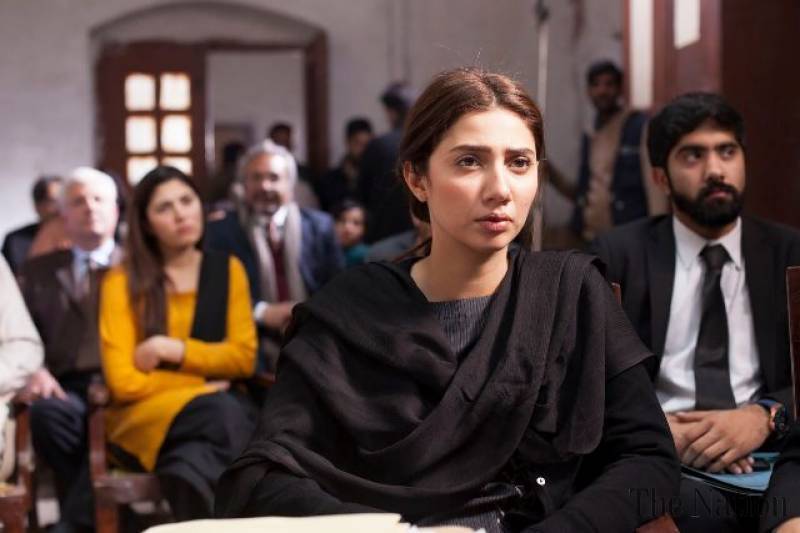After surviving a barrage of controversies and unforeseen hurdles surrounding the much hyped rape scene, Verna finally got a ‘good to go uncut’ by the censor board of Pakistan. The news of its release spread like a wildfire, much faster than the news of its ban. Though even before the release, its trailer did not seem promising to me with nothing much to harness my attention except for my newly won admiration for Mahira Khan after watching Sadkay Tumharay drama on a re-telecast on Hum TV and the brand in himself Shoaib Mansoor, I decided to give it a try.
However, the 300-seater cinema, where I and my enthusiastic women empowerment advocate gang drove to watch the ‘adult film’, as mentioned on the movie tickets, had hardly 15 people mostly women – young girls were present.
The movie is set in an upper class educated setup where a recently married, good looking couple were living in their perfect paradise, at least it was for the wife, Mahira Khan. The husband on the other hand, contracted polio and rightly blames his parents for his physical condition and was a crybaby throughout the film. His role does not develops as the drama unfolds and he never said a single word to support his wife who was passing through the ordeal of abduction and rape, instead blames her for the entire incident.
What Shoaib Mansoor’s Verna teaches married and unmarried women is that the public spaces, households are unsafe for them. No matter who they are, what they are doing or wearing they are always under a radar and most importantly, they have the choice to replace another prospective victim and get raped in their place (What rubbish). It also teaches women never to be over efficient in dealing with real life situations mainly because of the vulnerability of the honour that lies between their thighs. The movie teaches women to expect no support or help from parents, siblings and husband even if an open and obvious danger is upon them. It encourages women to take stupid steps to take revenge on the perpetrator. The message of the film is clear but it is perilous at many levels. By referring to the Stockholm Syndrome, the director has tried to escape from the silliest and outrageous suggestion he has given to the rape survivor, that is, they should fearlessly meet the rapist alone, break law and take revenge in their personal capacity (What rubbish).
With a society where women are still struggling to win their basic right to education and many pass through a tornado of insults to reach cinema halls, this message is extremely contagious and can jeopardise many lives.
However, unlike Shoaib Mansoor’s previous cinematic marvels, I am afraid to say that this movie will not bag him much appreciation. In fact, it will give his staunch critiques a very good reason to discourage his style of cinema in which he touches multiple societal issues at a limited reel time and space. Some filmmakers, writers and I often felt that Shoaib Mansoor tries to bring a lot to the plate and fails to do justice with the cause or subject at hand. Hence, resulting in many important issues not getting highlighted. Issues that otherwise could have caused an impact go unnoticed. It appears as if their concerns were real and Shoaib Mansoor could not hold his fortress with Verna. He was either eager to hastily finish the film or if given a benefit of doubt he was too concerned about the sensitivity of the subject that he forgot to strike the chord. Resulting in poor dialogues, bad locations, dull music - except for Power Di Game - and below average performances. Moreover, the movie was absolutely censored, in contrast with the movie’s PR campaign.
As far as Mahira’s performance is concerned, she has over acted at all those instances where she was supposed to stay mature. Smiling, laughing, chattering with your rapist just portrays the non-serious or insensitivity towards the cause. She is widely loved for her heart touching performances but I can vehemently say that this was her weakest performance till date.
I overheard someone saying, she is not meant for such serious roles. What??? Isn’t she good at rona dhona (crying) only? There were female university students and they were laughing and mimicking the movie. They were in constant denial that a rape survivor would ever behave with such immaturity. Nevertheless, people who have experienced even a bit of harassment, assault or rape, will not be able to connect with the character. It is mainly because at some point while screening, you either find yourself or hear someone laughing at the clumsy dialogues. I think if you hear people laughing at a situation where a rape victim is explaining her horrendous experiences, then the character and filmmaker have already lost their ground.
Will I recommend this movie to girls? The answer is NO.






